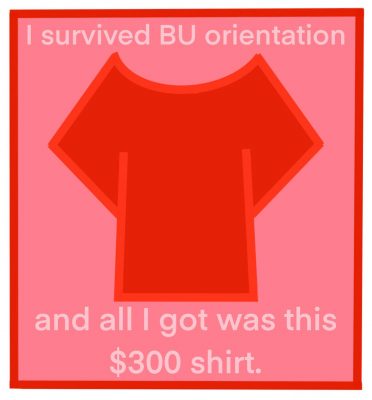Each summer, the newly admitted freshman class steps foot on Boston University’s campus to bridge the gap between high school and college. University Orientation is, for many, the entrance pass to the frontier of adulthood.
Since 1888, BU has implemented a similar in-person orientation each year. But 2020 marked an unprecedented break in pattern — the pandemic forced us to retreat to the digital world, using Zoom instead to guide and support new students.
As Orientation approaches for the Class of 2025, set online once more, it behooves us to examine our approach to acclimating freshmen.
It is painfully clear a remote orientation loses the charm that typically comes with the two-day campus experience. Though Orientation may be awkward, unsatisfactory or unhelpful for some students, it still provides an opportunity to get situated with the people, atmosphere, culture, campus and city.
The value is not in lasting friendships — those hastily formed at Orientation with the person you happen to be sitting next to or grouped with rarely stand the test of time after the first month’s glow wears off. In fact, the social pressure and expectation to immediately find your people can often be one of the more overwhelming aspects of those couple of days.

Rather, Orientation serves to help students develop a feel for their new home. Especially for international students who are not only new to the city or state but also the country, it can allow them the space to overcome their anxieties before the official start of school. With free time between activities and speeches to socialize with other students on campus and take excursions in the city, the experience eases freshmen into life at BU.
So, then, is an online Orientation even necessary? It falls short of a true Orientation, and it’s upsetting the exorbitant $320 cost is still in place for a watered-down version with no free housing, accommodations or first-hand campus experiences.
One might also ask if an in-person adaptation would be feasible because BU has the infrastructure to invite students on campus for the Spring semester.
It may be a fun idea to entertain, but it comes with its own assortment of issues. Students can’t be expected to travel — whether from a low-risk state with less rigorous travel advisories, such as Hawaii, or across the country or outside the United States — for a mere two-day event. It would be irresponsible, and in this decision, the University is wholly justified.
Furthermore, Orientation provides valuable experience connecting with advisors, mentors and peers from your class and college — even if it has to be hosted virtually.
Instead, we should focus on emphasizing and attempting to re-create the social bonding experience in a meaningful way through the virtual Orientation — not just awkward icebreakers in breakout rooms, but activities and discussions.
The University has already implemented a Common Ground discussion in their Orientation schedule that plans to connect groups of students, but it’s a mere 45 minutes. In total, the amount of time spent virtually with other students is far outweighed by the sheer length of speeches.
This can be said about in-person Orientation as well, but the edge of boredom is softened by absurd plays and skits, group trips to places on campus or in the city, and the people beside you. Still, both programs would benefit from streamlining the schedule and perhaps shortening Orientation overall. If the information can be sent in an email, it should be.
Orientation should be less talking at you and more about connection and exploration. In the same vein of thought, there is not enough time spent with your “academic groups,” or mentors and peers in your selected college.
In a time when connection is difficult to establish, it would also be a great improvement if there were first-year mentor-mentee programs within each college, such as the one in the College of Fine Arts’ School of Music.
Though some colleges may have student advisor programs, it doesn’t provide the same comfort or personalized relationship as one-on-one mentors from whom students can seek peer guidance.
Understandably, it may be much harder to implement these types of programs in larger colleges such as the College of Arts and Sciences, but even if it were an opt-in opportunity, it could aid many incoming freshmen looking for assistance.
Losing such a defining cornerstone of the college experience is saddening, and we feel for the Class of 2025 and 2024. Hopefully, the new rendition of Zoom University orientation will be more fruitful than the last and future in-person orientations will follow this year’s.
But if it is of any comfort, Orientation is only the first step of your next four years. It will not be the defining factor of your life at BU, nor will it make or break your social status. After all, it’s only a couple of days and you’ll have much more time on campus and in classes to learn your way around and find your community here.















































































































